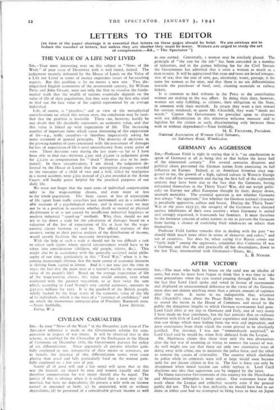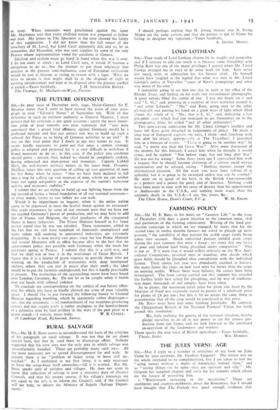AFTER VICTORY Sra,—The man who built his house on the
sand was an idealist of sorts, but even he must have begun to think that it was time to take some precautions when the rain started pouring through his roof. So the fact that Lord Cecil spoke and voted in favour of rearmament and displayed an unaccustomed deference to the views of the Govern- ment does not denote anything more than a certain amount of sapience after the event. It seems to me indisputable that, whatever Mr. Churchill's ideas about the Peace Ballot were, he was the first to sound the tocsin in the House of Commons and reveal to the public the dangerous lengths to which German rearmament had gone. Lord Cecil jibes at my trip to Germany and Italy, one of very many I have made on four continents, but the fact remains that an ordinary observer with little of Lord Cecil's great experience and inside informa- tion saw things which were hidden from the wise and imprudent, and drew conclusions from them which the event proved to be absolutely justified. For instance, I was not " tremendously surprised," as Lord Cecil said he would be, when Italy defected from the League.
Mr. Martineau claims that there were only the two alternatives after the last war of rearming or trying to remove the causes of war. As well might one say that there are only two alternative ways of doing away with crime, one to maintain the police force, and the other to remove the causes of criminality. The country which abolished its police while its criminals were still at large would soon become unfit for any decent citizen to live in. The fact is force can only be abandoned when moral suasion can safely replace it. Lord Cecil disclaims any idea that aggression can be stopped by the latter.
To blame successive Governments of this country for the Manchukuo and Abyssinian imbroglios is most unjust. Our statesmen knew the truth about the League and collective security even if the general public did not. The fact is that, militarily, we should have had to act alone in either case had we attempted to bring force to bear on Japan or Italy. When sanctions were proclaimed against the latter Mr. Martineau says that every civilised nation was prepared to follow our lead. My letters to The Spectator at the time showed the falsity of this supposition. I did not know then the full extent of the treachery of M. Laval, but Lord Cecil apparently did, and so, let us remember, did Mussolini, who was sent supplies by some of the very Powers whose representatives voted for sanctions at Geneva.
Idealism and realism must go hand in hand when this war is over. I do not sneer at ideals ; as Lord Cecil says, it would ill become a clergyman to do so ; but the attempt to put them wholesale into practice in the present semi-barbarous state of European civilisation would be just as fatuous as trying to reason with a tiger. What we have to secure is that might shall be at the disposal of right in existing circumstances and kept at its disposal after the present conflict































 Previous page
Previous page